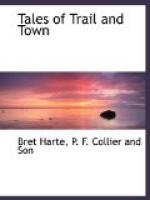“An American.”
“Ah!”
The carriage drove on and entered the gates of the chateau. And Monsieur Ribaud, cafe proprietor and Social Democrat, straightened himself in the dust and shook his fist after it.
A NIGHT ON THE DIVIDE
With the lulling of the wind towards evening it came on to snow—heavily, in straight, quickly succeeding flakes, dropping like white lances from the sky. This was followed by the usual Sierran phenomenon. The deep gorge, which, as the sun went down, had lapsed into darkness, presently began to reappear; at first the vanished trail came back as a vividly whitening streak before them; then the larches and pines that ascended from it like buttresses against the hillsides glimmered in ghostly distinctness, until at last the two slopes curved out of the darkness as if hewn in marble. For the sudden storm, which extended scarcely two miles, had left no trace upon the steep granite face of the high cliffs above; the snow, slipping silently from them, left them still hidden in the obscurity of night. In the vanished landscape the gorge alone stood out, set in a chaos of cloud and storm through which the moonbeams struggled ineffectually.
It was this unexpected sight which burst upon the occupants of a large covered “station wagon” who had chanced upon the lower end of the gorge. Coming from a still lower altitude, they had known nothing of the storm, which had momentarily ceased, but had left a record of its intensity in nearly two feet of snow. For some moments the horses floundered and struggled on, in what the travelers believed to be some old forgotten drift or avalanche, until the extent and freshness of the fall became apparent. To add to their difficulties, the storm recommenced, and not comprehending its real character and limit, they did not dare to attempt to return the way they came. To go on, however, was impossible. In this quandary they looked about them in vain for some other exit from the gorge. The sides of that gigantic white furrow terminated in darkness. Hemmed in from the world in all directions, it might have been their tomb.
But although they could see nothing beyond their prison walls, they themselves were perfectly visible from the heights above them. And Jack Tenbrook, quartz miner, who was sinking a tunnel in the rocky ledge of shelf above the gorge, stepping out from his cabin at ten o’clock to take a look at the weather before turning in, could observe quite distinctly the outline of the black wagon, the floundering horses, and the crouching figures by their side, scarcely larger than pygmies on the white surface of the snow, six hundred feet below him. Jack had courage and strength, and the good humor that accompanies them, but he contented himself for a few moments with lazily observing the travelers’ discomfiture. He had taken in the situation with a glance; he would




